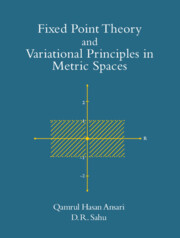Book contents
- Frontmatter
- Dedication
- Contents
- Preface
- Acknowledgments
- Notations and Abbreviations
- 1 Basic Definitions and Concepts from Metric Spaces
- 2 Fixed Point Theory in Metric Spaces
- 3 Set-valued Analysis: Continuity and Fixed Point Theory
- 4 Variational Principles and Their Applications
- 5 Equilibrium Problems and Extended Ekeland’s Variational Principle
- 6 Some Applications of Fixed Point Theory
- Appendix A Some Basic Concepts and Inequalities
- Appendix B Partial Ordering
- References
- Index
3 - Set-valued Analysis: Continuity and Fixed Point Theory
Published online by Cambridge University Press: 15 July 2023
- Frontmatter
- Dedication
- Contents
- Preface
- Acknowledgments
- Notations and Abbreviations
- 1 Basic Definitions and Concepts from Metric Spaces
- 2 Fixed Point Theory in Metric Spaces
- 3 Set-valued Analysis: Continuity and Fixed Point Theory
- 4 Variational Principles and Their Applications
- 5 Equilibrium Problems and Extended Ekeland’s Variational Principle
- 6 Some Applications of Fixed Point Theory
- Appendix A Some Basic Concepts and Inequalities
- Appendix B Partial Ordering
- References
- Index
Summary
The first natural instance when set-valued maps occur is the inverse f −1 of a single-valued map f from a set X to another set Y. We can always define f −1 as a set-valued map which associates with any data y the (possibly empty) set of solutions
f −1(y) = ﹛x ∈ Xf (x) = y﹜
to the equation f (x) = y. Kuratowski realized the importance of set-valued maps, also called multivalued maps or point-to-set maps or multifunctions, and devoted considerable space in his famous book on topology. Other eminent mathematicians, namely, Painlevé, Hausdorff, and Bouligand, have also visualized the vital role of set-valued maps as one often encounters such objects in concrete and real-life problems. However, the authors of Bourbaki's volume Topologie Génerale emphasized the study of properties of set-valued maps as single-valued maps from a set to the power set of another set, or factorizing single-valued maps to make them bijective. This came as a stumbling block in the progress of this field. The set-valued maps started becoming popular among mathematicians working in the areas of game theory and economics when Kakutani's fixed point theorem [109], an extension of Brouwer's fixed point theorem to set-valued maps, came in existence, which was motivated by the work of Von Neumann. In 1969, Nadler [131] extended the Banach contraction principle to set-valued maps which plays an important and vital role in the theory of variational inequalities, differential inclusions, control theory, fractal geometry, etc. Since then, the theory of set-valued maps became an important subject for mathematicians working in nonlinear analysis, optimization theory, game theory, control theory, economics, fractal geometry, etc.
In view of such a wide variety of applications, most of the basic notions and results of singlevalued maps have been extended to set-valued maps. These include:
• Limits and continuity
• Nonlinear functional analysis (existence and approximation of solutions to equations and inclusions; fixed point theory; etc.)
• Tangents and normals
• Differentiation of set-valued maps
• Convergence of a sequence of set-valued maps
• Measures and integration
• Differential inclusions
- Type
- Chapter
- Information
- Publisher: Cambridge University PressPrint publication year: 2023



